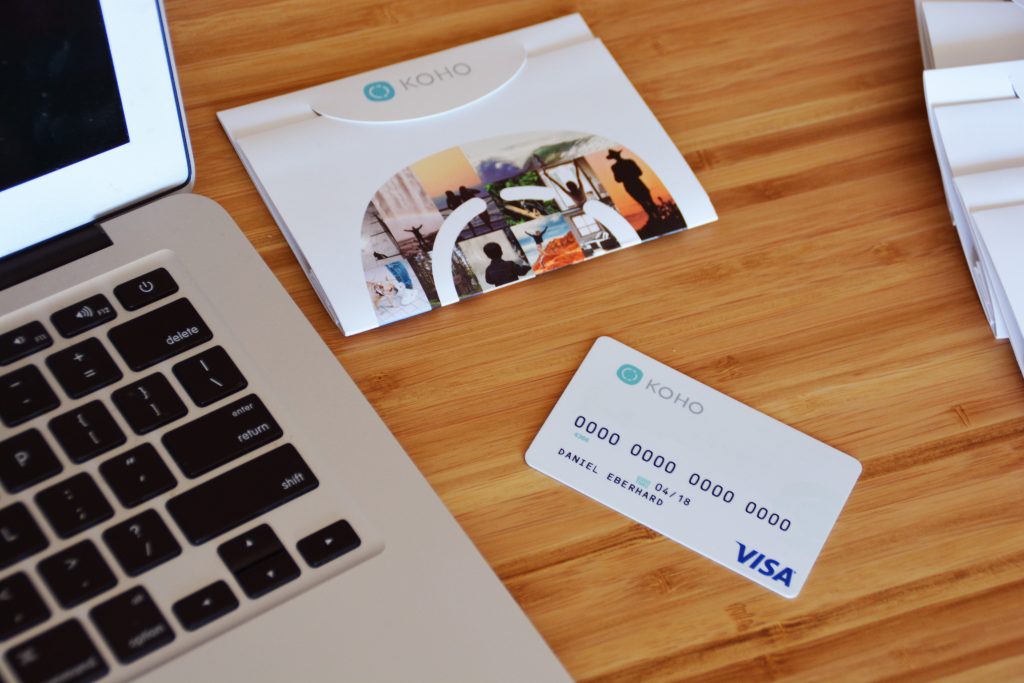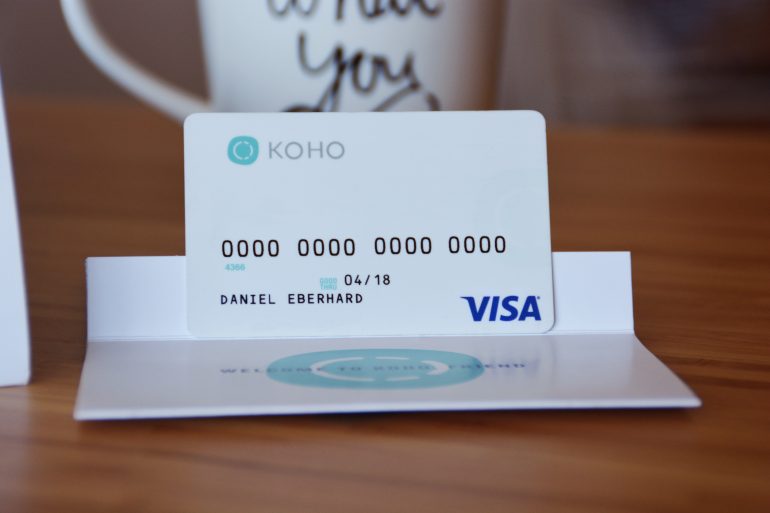Daniel Eberhard walks and talks like a man waiting for a delivery – with polite impatience. Except it’s not a delivery for him, it’s for his new customers.
More than eighteen months after its announced launch (with another eight months in stealth mode), Koho is finally ready to release product in Canada. The Vancouver-based startup has more than 7,000 people on its early waitlist, and has begun a controlled rollout (first to 100 people, then 500, then 1000, etc) of both its app and the little plastic card people around the world associate with saving (and spending) money.
Koho handles the front-end experience of managing your money the way you hope a 21st-century company would, while Peoples Trust, a federally chartered financial institution, actually holds it (more on how this works here). BetaKit has had early access for some time now, and many of the core features are already working (direct deposit, purchases, real-time financial updates), while others are on the way (bill payment and money transfers from outside Koho’s network). The company knows its close, but how close is to be determined.
“It’s arguably one of the strongest investor pools in Canada.”
“We don’t know how far away the product is from complete market readiness until we get it in 100 people’s hands that don’t know us personally,” said Eberhard, Koho’s CEO and co-founder. “Once we get it in their hands, we get a sense of how ready we are for market and how ready we are to scale.”
The staged rollout will take time, perhaps unbearably long for some of Koho’s early adopters, but there’s a keen understanding to the regimented process: one does not screw with other people’s money lightly. Besides, Eberhard tells me, the waiting just adds to the anticipation. It’s now the Summer of Koho.
It’s a healthy perspective for someone that has been waiting almost three years to deliver his FinTech vision to Canada, one that some have openly questioned the feasibility and sensibility of. But beyond the launch, Eberhard has another reason to feel confidant: new financial backing. Following it’s $1 million seed round last May, Koho has raised additional funding from Power Financial Corporation, Shopify co-founder Scott Lake, Hootsuite co-founder David Tedman, Rashay Jethalal, former CIBC Head of Global Banking, and Adam Felesky, former CEO of Horizons ETF. Previous investors Ferst Capital will also be joining Koho’s board.
“It’s arguably one of the strongest investor pools in Canada,” Eberhard said, noting that aside from Power, “every investor that has signed on has an incredible depth of experience running, operating, product-based technology companies. When it comes to understanding what Koho needs to create value, we have multiple billion dollar companies that have been founded within our investor group.”

Eberhard won’t say how much Koho raised, which means two things: the amount isn’t huge; the money is intended to keep the lights on while the company improves the customer in preparation for a true scale-up. A strong product and customer experience focus is the modus operandi for every Canadian FinTech startup, but Koho takes it more seriously than most. The company has prepped its dev team to release 100 service updates in its limited release this year, a level of iteration far beyond traditional financial services. The rest of the time will be dedicated to simply listening to customers and gathering feedback (BetaKit can vouch for Koho’s in-app customer service communication tool, which to date has been exceptional).
While Koho is not a bank, you could say that Power’s FinTech lineup comprises a Startup Bank: spending, lending, investing, with health insurance thrown in for good measure.
“We’ve made a series of assumptions and certainly done our homework in terms of de-risking the value prop and seeing what’s interesting to consumers about Koho,” Eberhard said. “But we don’t know, and I think we’re going to spend the next 6 months crystallizing that notion, and that’s 100% a part of the plan.”
“What I really want to do is just listen to people and understand what it is in their financial lives we can improve, and Koho is the conduit for that.”
Of course, any conversation about the future of Koho is inevitably a conversation about Power Financial, which continues to build a portfolio of financial services with its investments. While Koho is not a bank, you could say that Power’s FinTech lineup comprises a ‘Startup Bank’: spending (Koho), lending (Borrowell), and investing (Wealthsimple) money, with health insurance (LEAGUE) thrown in for good measure. Eberhard, to his credit, was the most forthright founder of any I had asked about Power’s FinTech Justice League strategy.
“Power as an investor has been incredibly supportive, but hasn’t told us in any way shape or form what we need to do, so we do have a lot of optionality around that,” he said. “But I think it makes a ton of sense.”
Eberhard was firm that the current focus for Koho, however, is entirely on product and customers, gathering feedback and feature requests to make the service great. Of course, when I asked him if he was anticipating a lot of feedback and feature requests for additional financial services that could be easily integrated and provided by FinTech companies in Power’s portfolio, thus significantly increasing the value and reducing the cost of customer acquisition for everyone, Eberhard could only laugh.
“Yes, I would expect that would be part of the feedback we’d collect.”


